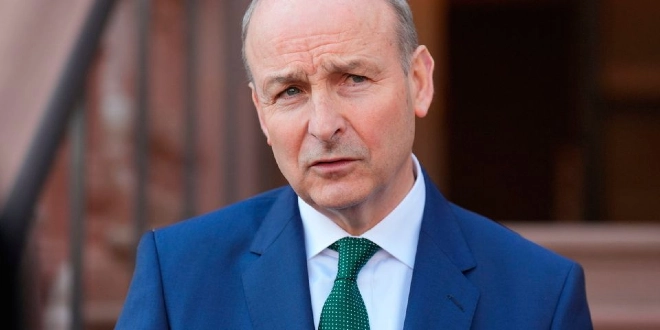Taoiseach Micheál Martin has confirmed that Ireland will make use of every available option—both within the EU framework and through direct engagement with the United States—to respond to new US tariffs expected to be introduced this Wednesday. The upcoming measures, dubbed “Liberation Day” by President Donald Trump, are anticipated to affect all countries, not just those with the largest trade imbalances. This sweeping action could have significant repercussions for Ireland, especially for its pharmaceutical, food, and beverage exports.
While trade policy remains an exclusive function of the European Commission, Mr Martin emphasized Ireland’s dual-track approach: participating in a coordinated EU response while also holding bilateral discussions with US authorities and impacted multinational companies. Speaking at Government Buildings, he stressed the economic threat posed by tariffs and the need for Europe to respond with strategic restraint that maximizes leverage without inviting further damage.
The Taoiseach also pointed to Ireland’s internal efforts, noting that new infrastructure investments—particularly in energy and water systems—would help bolster competitiveness and offset potential economic fallout. Legislation for the EU-Canada trade agreement is also expected soon, as part of broader diversification efforts.
EU Coordination and Irish Outreach Intensify
Ahead of the tariff announcement, contact between EU institutions and member states has ramped up. European Commission President Ursula von der Leyen held a phone call with Mr Martin to discuss expectations and to coordinate a response. The Taoiseach reiterated Ireland’s key concerns, particularly in sectors such as pharmaceuticals and food production. Both leaders agreed that the EU’s response should be balanced, measured, and grounded in a robust trade strategy.
EU trade spokesperson Olof Gill confirmed that ongoing engagement with national governments is essential to formulating a targeted response that minimizes negative impacts on the European economy while exerting appropriate pressure on the US.
On the domestic front, Tánaiste Simon Harris is holding a series of high-level meetings with European counterparts, including trade and foreign ministers from the Netherlands, Denmark, and Croatia. These discussions will focus not only on the US tariffs but also on the broader geopolitical landscape, including the war in Ukraine.
Meanwhile, Minister for Employment Peter Burke called for a focused and proactive approach to safeguarding Ireland’s economic resilience. Speaking at the launch of Datavant’s Irish office in Galway, which is expected to create 125 jobs, he highlighted the importance of innovation and research-driven investment.
Mr Burke noted that despite the uncertainty, Ireland’s strong economic fundamentals and recent R&D commitments—many involving US companies—signal continued confidence in the country as a hub for international business.
 The Daily Star Ireland
The Daily Star Ireland

